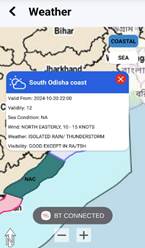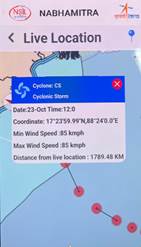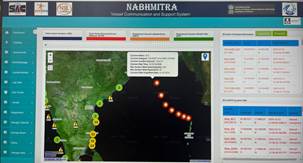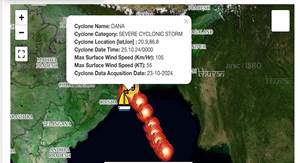Ministry of Fisheries, Animal Husbandry & Dairying
Indigenous Transponders Become Lifeline for Fishermen During Cyclone DANA
Posted On:
29 OCT 2024 2:31PM by PIB Delhi
The Department of Fisheries under the Ministry of Fisheries, Animal Husbandry, and Dairying (MoFAH&D) with the help of the Vessel Communication and Support System under the Pradhan Mantri Matsya Sampada Yojana has been able to enhance the safety and security of fishermen at sea. Launched by Prime Minister Shri Narendra Modi, from Palghar, Maharashtra on 30th August, 2024 this project has an outlay of ₹364 crores. These transponders are being given to the fishermen free of cost. This initiative of MoFAH&D for Vessel Communication and Support System, featuring indigenous transponder technology, has demonstrated its capability in safeguarding fishermen during Cyclone DANA. This system aims to ensure safety and security of the fishermen while at sea for fishing by enabling them for two-way communication which was not possible before induction of this technology beyond mobile coverage range. Government of India has planned to install indigenously developed transponders on One Lakh fishing vessels in all 13 coastal states and UTs. This technology was developed by Indian Space Research Organisation (ISRO) and is being implemented through NewSpace India Ltd(NSIL) which is the commercial arm of ISRO under Department of Space (DoS).
Recently, Odisha was proactive in installation of these transponders and more than 1000 transponders have been installed in the state. This technology has proved as a lifeline for the fishermen of Odisha by providing support to them during the recent cyclone that impacted the Odisha coast and adjoining areas of the Bay of Bengal. As Cyclone DANA approached the state of Odisha recently, the Odisha State Relief Commissioner issued a warning on 20th October 2024, based on the India Meteorological Department's midday bulletin. The warnings and advisories were issued on real-time basis to the fishermen using Vessel Communication and Support System. This has not only helped in saving life of the fishermen out at sea but also helped in preventing damage to their resources.
Through these transponders, advisories were issued to the fishermen out at sea through Space Application Centre (SAC), Ahmedabad to avoid venturing into the sea from 21st October to 26th October 2024. It was also advised to the fishermen out at sea to return to the shore immediately. The timing of this warning was significant, allowing fishermen to take necessary precautions before the cyclone made landfall. The messages sent to fishermen included, “Fishermen out at sea are advised to return to the coast immediately,” and “Fishermen are advised not to venture into the sea off Odisha Coast and adjoining North Bay of Bengal during 21st to 26th October 2024.” These broadcast messages were communicated in both English and Odia, ensuring that all fishermen could understand the severity of the situation.
Traditionally, authorities relied on Very High Frequency radio and phone calls to contact vessels, depending on boat owners to provide their exact locations. This method posed significant challenges, as locating mechanized trawlers in distant waters was often difficult. Moreover, some owners were unable to provide precise information on their vessel numbers and locations. This lack of accurate data hindered effective communication and posed serious risks to the safety of the fishermen at sea. With the Vessel Communication and Support System in place, officials could send a mass broadcast message on the evening of 20th October 2024 to all vessels at sea, utilizing satellites from the Indian Space Research Organisation. This timely broadcast was a game changer, prompting a swift response and enabling the vessels to return to shore by the morning of 21st October 2024. The mass message was not just a notification; it was a lifeline that significantly improved the chances of safety for those at sea.
The use of transponders and the Nabhmitra Application played a pivotal role in enhancing safety during Cyclone DANA by enabling effective tracking of vessel positions and monitoring their speeds. This application allowed officials to estimate the time of arrival for each vessel at shore, which was paramount in ensuring that fishermen could return safely before the cyclone made landfall. The Nabhmitra Application offers comprehensive tracking features that include essential boat information, such as boat numbers and transponder IDs. By providing real-time updates on location, course and speed, the application helped authorities maintain an accurate understanding of each vessel's movements.


Moreover, the application served as a valuable source of cyclone information, detailing the cyclone's name, category, and specific location through precise latitude and longitude coordinates. This data was complemented by the cyclone's date and time, maximum surface wind speeds, and the date when this information was acquired. By having this significant information readily accessible, fishermen were better equipped to respond to the unfolding situation. In addition to cyclone-related data, the Nabhmitra Application also provided important weather updates, including sea conditions, wind speed and direction, and visibility. This holistic view of the maritime environment was instrumental for fishermen, allowing them to make informed decisions about their safety. With these tools at their disposal, authorities were able to coordinate the return of fishermen effectively, ensuring they received timely alerts and could navigate the dangers posed by the approaching cyclone.


The ability to track vessels in real time represented a significant leap forward in crisis management. Officials could monitor approximately 126 boats from Paradeep that were further out at sea, ensuring the safe return of all boats by 22nd October 2024, well before Cyclone DANA made landfall. This enhanced tracking capability helped authorities stay informed about the vessels’ conditions, allowing them to respond effectively to any emergencies. Furthermore, the communication capabilities of the Vessel Communication and Support System were instrumental in disseminating emergency messages in local languages. This feature ensured clarity and urgency, allowing fishermen to comprehend the importance of returning to safety without delay. The multilingual support enhanced the system's effectiveness, as many fishermen may not be fluent in English or Hindi. By using local dialects, the authorities could convey essential information more effectively, further reducing response times.
The level of coordination achieved during this crisis was only possible through the Vessel Communication and Support System. The system not only enabled a proactive response but also facilitated collaboration among various stakeholders, including the Department of Fisheries, the Coast Guard, and local authorities. This level of inter-agency cooperation is important during emergencies, ensuring that resources are allocated effectively, and that the response is as swift as possible. The successful deployment of the Vessel Communication and Support System during Cyclone DANA represents a remarkable milestone in crisis management and disaster preparedness. It showcases how technology can be leveraged to protect livelihoods while enhancing the resilience of coastal communities against natural disasters. The system has marked an impressive improvement in crisis management and has showcased the transformative potential of the Vessel Communication and Support System.
The response to Cyclone DANA has underscored the capabilities of transponder technology in protecting the lives of fishermen and enhancing India’s preparedness for future maritime challenges. By enabling real-time communication and monitoring, the Vessel Communication and Support System sets a new standard in maritime safety. The effectiveness of the system during this crisis serves as a template for future implementations, suggesting that similar technologies can be used in other regions and situations to enhance safety and preparedness.
The lessons learned from the response to Cyclone DANA are invaluable. It is imperative that the adoption of advanced technologies for disaster management is a key step. The Vessel Communication and Support System highlights the importance of investment in maritime safety infrastructure. The Vessel Communication and Support System has proved to be a significant asset during Cyclone DANA, ensuring the safety and security of fishermen at sea. By facilitating real-time tracking, effective communication, and coordinated emergency responses, the system exemplifies how technology can enhance maritime safety in the face of natural disasters. The successful outcomes achieved during this crisis serve as a testament to the effectiveness of integrating advanced technologies in safeguarding livelihoods and enhancing preparedness for future challenges. As India continues to strengthen its maritime safety framework, the lessons learned from Cyclone DANA will guide future initiatives, ultimately fostering a safer environment for the fishing community. The path to safety has been significantly illuminated through the effective use of indigenously designed and developed Vessel Communication and Support System, ensuring that fishermen are well-informed and can navigate the challenges posed by nature with greater confidence.
****
AA
(Release ID: 2069157)
Visitor Counter : 1358